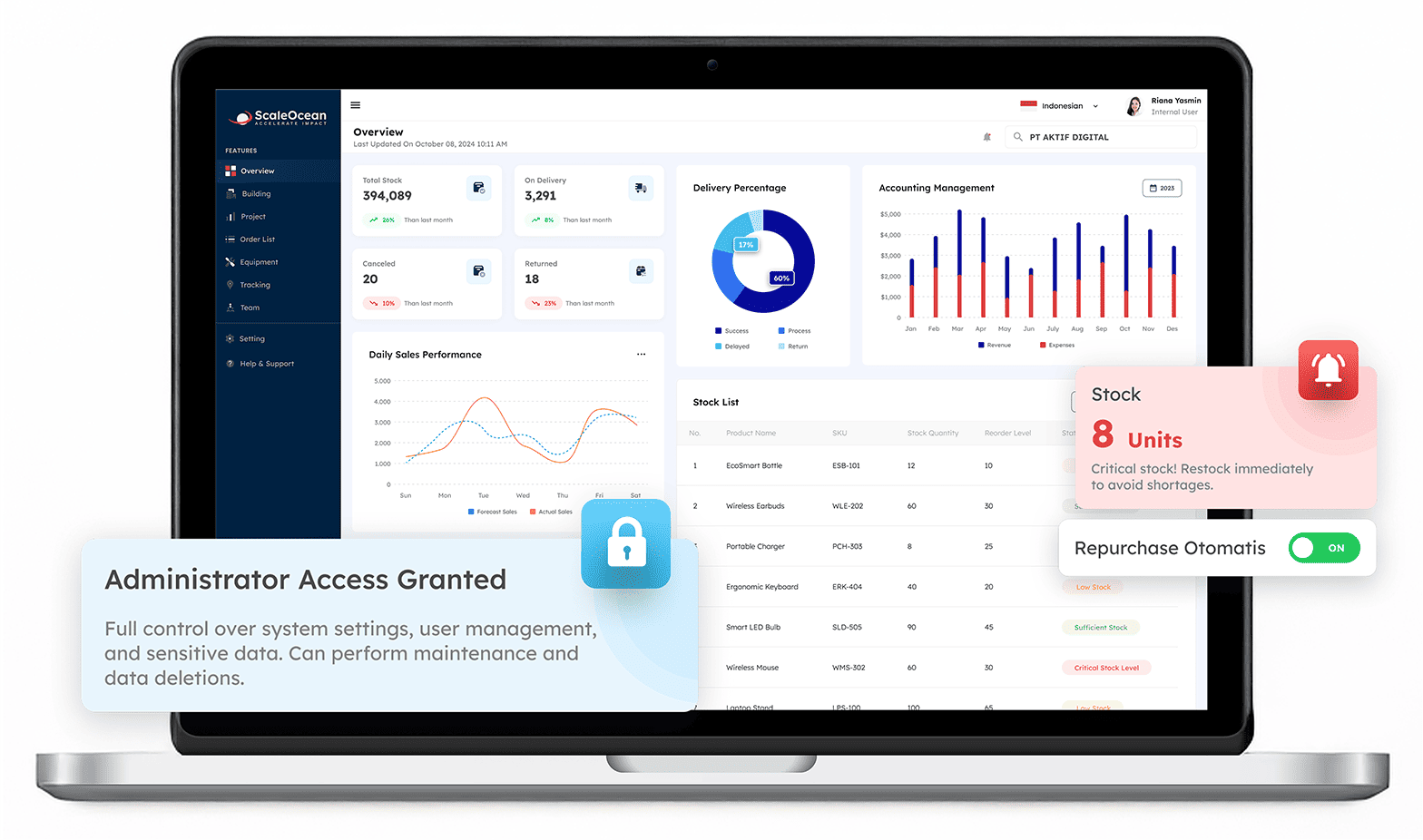In today’s fast-changing business climate, Singapore’s service companies are increasingly using Enterprise Resource Planning (ERP) systems to improve operational efficiency, streamline operations, and preserve competitiveness. You should use the best ERP for service companies to allow seamless data flow and informed decision-making.
It also analyzes ERP market trends, such as cloud-based solutions and enhanced analytics. According to Imarc Group, the Singapore ERP software market, which was valued at US$218 million in 2023, is predicted to reach US$586 million by 2032, rising at an 11.60% CAGR.
This integration is especially important in Singapore, where enterprises try to innovate and respond to global market needs. This article examines the importance of ERP systems for service companies, concentrating on benefits such as increased efficiency, cost savings, and better decision-making. Learn more here!
- ERP for service companies is crucial for improving efficiency, integrating processes, and enhancing decision-making in industries like IT, healthcare, and consultancy.
- Key features of ERP for service companies are project and resource management, financial and accounting, client relationship management, time and expense tracking, and business intelligence and reporting
- Examples of ERP software for service companies include ScaleOcean, Striven, Scoro, Odoo, Microsoft Dynamics 365, BQE Core, and many others
- Scaleocean’s Professional Service ERP Software is an all-in-one ERP solution for service companies, offering integration, scalability, automation, and real-time insights to streamline operations.

What is ERP for Service Companies?
ERP for service companies combines essential business functions such as project management, financial tracking, resource allocation, and client management into a single system, enhancing efficiency and boosting profitability.
In today’s fast-paced business environment, Singapore’s service companies must constantly streamline their operations to remain competitive. An Enterprise Resource Planning (ERP) system is required to integrate corporate processes, increase efficiency, and ensure higher customer satisfaction.
Service businesses, such as those in IT, consultancy, and healthcare, can greatly benefit from ERP solutions that improve business agility, financial management, and resource allocation. Similarly, ERP software for the banking sector enhances operations and compliance, catering to specific industry needs.
The value of ERP systems for service companies cannot be emphasized. Singapore’s business sector is very dynamic and competitive, so enterprises must embrace cutting-edge technology to stay ahead.
The best ERP for professional service companies assists service businesses in managing their operations more effectively by automating tasks, minimizing manual labor, and offering real-time insights into multiple business functions such as project management, human resources, and client services.
Companies in Singapore can cut operational costs and improve overall service performance by implementing the appropriate ERP. The systems improve service firms’ efficiency, accuracy, and collaboration by automating processes, centralizing data, and giving real-time insights, resulting in better decision-making and customer satisfaction.
The Benefits of Implementing ERP in Service Companies
Implementing an ERP system in service companies offers a wide range of benefits, from streamlined operations to improved financial visibility.
ERP systems help businesses automate processes, enhance communication, and provide valuable insights, enabling professional service industries to optimize their workflow and make data-driven decisions for growth. Here are the benefits for service companies that implement ERP software, including:
1. Improved Efficiency and Productivity
ERP systems automate routine tasks, such as data entry, invoicing, and resource allocation, reducing manual work and minimizing human error. This automation allows employees to focus on higher-value tasks, resulting in improved efficiency and productivity across departments, leading to faster project delivery.
2. Better Financial Management
With an ERP system, service companies can gain real-time visibility into financial data, including project costs, revenue, and cash flow. By centralizing financial operations, businesses can track expenses, manage budgets, and generate accurate financial reports. This leads to better financial control and more informed decision-making.
3. Enhanced Project Management
ERP systems provide tools for project planning, resource allocation, and time tracking, allowing professional service companies to manage projects more effectively. With real-time updates on project progress and resource utilization, businesses can ensure that projects are delivered on time and within budget, improving client satisfaction and profitability.
4. Stronger Client Relationships
ERP systems integrate client data, enabling service companies to manage customer interactions and track sales leads. This centralized information helps improve communication, personalize services, and streamline support.
As a result, companies can build stronger relationships with clients, enhance customer satisfaction, and boost retention rates.
5. Real-Time Data and Business Insights
ERP systems offer real-time data analytics and reporting capabilities, providing businesses with valuable insights into performance metrics. By monitoring key indicators such as project profitability and resource utilization, service companies can make data-driven decisions, improve operational efficiency, and identify growth opportunities.
Key Features ERP for Service Companies
Service companies face unique challenges in managing projects, resources, and customer relationships. An ERP system tailored for service companies provides a comprehensive solution, integrating essential functions like project management, financial tracking, CRM, and reporting.
These features of ERP for professional service industries can streamline operations and enhance efficiency across various departments. The following are features that must be present in ERP software for service companies, including:
1. Project and Resource Management
ERP systems enable service companies to plan and manage projects from start to finish. The system allocates resources effectively, tracks progress, and monitors billable hours, ensuring projects stay within scope, on schedule, and under budget. This integration helps optimize resource utilization and increase project profitability.
2. Financial and Accounting
By implementing ERP software, service companies can centralize financial operations, simplifying cost management, invoicing, and financial reporting.
The system provides real-time visibility into project costs, helping businesses track expenses, manage cash flow, and ensure timely and accurate billing. This leads to better financial decision-making and improved profitability.
3. Client Relationship Management (CRM)
ERP systems integrate CRM functionalities to help service companies track customer interactions and manage sales leads. By centralizing client data, businesses can improve customer service, enhance communication, and streamline sales processes, ultimately strengthening client relationships and increasing customer retention.
4. Time and Expense Tracking
ERP systems automate the tracking of employee time and project expenses, reducing administrative burdens. This feature allows for accurate billing and ensures that companies can track labor costs and project expenses in real-time.
It can also help companies to service businesses, control costs, stay within budgets, and improve overall project profitability.
5. Business Intelligence and Reporting
ERP systems provide real-time business intelligence, offering insights into project profitability and company performance.
Dashboards and detailed reports allow decision-makers to analyze key metrics, assess project outcomes, and identify areas for improvement. This helps professional service industries make data-driven decisions to drive growth and optimize operations.
Important Things in the Best ERP for Professional Service Industries in Singapore
Choosing the best ERP for service companies can be a game-changer, but with so many options available, it’s crucial to understand which features will benefit you most. To help you make the right decision, here are the things to consider when evaluating ERP solutions, including:
1. Industry-Specific Needs
Every sector has its unique challenges and demands. In service-oriented fields such as consulting or professional services, the best ERP for professional service industries is designed to meet these particular needs and will be more beneficial.
Whether it involves managing client interactions, monitoring project schedules, or processing invoices, the appropriate ERP should address the specific requirements of your sector.
2. Customization and Flexibility
Your business operations may change over time, making it essential to select an ERP that supports customization. The top ERP systems provide adaptable configurations, allowing you to modify the software as your business expands.
Seek an ERP that delivers customized workflows, reporting, and user permissions that align with your operational needs.
3. Cloud-Based vs. On-Premise
Choosing between a cloud-based and an on-premise ERP solution is a crucial decision. Cloud-based ERP provides advantages like scalability, accessibility from anywhere, and reduced initial expenses, making it an appealing choice for companies seeking adaptability.
In contrast, on-premise ERP might provide better control over security and data handling, but it typically incurs higher maintenance costs and requires substantial infrastructure.
4. Scalability
As your company expands, your ERP system should be able to grow alongside it. Choose an ERP that can manage higher transaction volumes, larger teams, and extra business processes without sacrificing performance.
Scalability ensures you won’t have to change systems as your organization develops, which will save you time and money over the long run.
5. Integration Capabilities
A well-integrated ERP with your current systems, including CRM, project management applications, and accounting programs, is essential.
Smooth integration aids in breaking down data silos, minimizes the likelihood of errors, and enhances overall productivity by facilitating a seamless flow of information throughout all business operations. Ensure that you select an ERP that is compatible with the systems you are already using.
6. User-Friendliness
Regardless of the strength of an ERP system, if your team struggles to use it, its effectiveness will diminish. Seek an ERP that features an easy-to-use interface that reduces the learning curve. Also, verify that the system includes extensive training and support materials to assist your staff in mastering the software to maximize its capabilities.
15 Examples of ERP Software for Service Companies in Singapore
Choosing the correct ERP system is critical for service firms that want to remain efficient, cost-effective, and competitive. While there are several solutions on the market, it is critical to choose a system that is customized to your company’s specific requirements.
For service companies, robust ERP solutions consist of ScaleOcean, Striven, Scoro, Odoo, Microsoft Dynamics 365, and BQE Core, all presenting distinct advantages in aspects such as project management, automation, and financial oversight. Here are the recommendations of ERP for service companies:
1. ScaleOcean ERP
ScaleOcean’s professional services ERP software is designed for service companies seeking an integrated, adaptable solution to streamline operations. It helps manage core processes like CRM, project tracking, and reporting, improving efficiency and enabling data-driven decisions.
The system supports financial management and performance, scales with your business, and offers automation and real-time insights to help companies adapt and thrive in a dynamic market.
Scaleocean ERP software is flexible to use by companies in Singapore to manage operations such as HR, payroll, project tracking, and financials, enhancing efficiency and streamlining processes.
To experience the benefits firsthand, we offer a free demo to show how Scaleocean can transform your business. Additionally, Scaleocean supports businesses in Singapore by helping them leverage the CTC grant, which can reduce the cost of implementing ERP solutions.
Key Features
- Customer Relationship Management (CRM): Efficiently manage customer data, track interactions, and oversee sales pipelines.
- Project Management: Track project timelines, resource allocation, and profitability.
- Resource Scheduling: Schedule staff based on availability and skillset to optimize productivity.
- Time Tracking: Monitor billable hours and project costs for efficient billing.
- Invoicing and Billing: Automate the invoicing process and reduce administrative time.
- Reporting and Analytics: Gain real-time insights into KPIs for data-driven decisions.
| Pros | Cons |
|---|---|
|
|
2. Odoo
Odoo is an all-in-one ERP solution designed for service companies looking to streamline their operations. With a suite of integrated apps covering everything from CRM to project management and inventory, Odoo’s open-source platform allows businesses to manage both front and back-office tasks efficiently.
Key Features
- Integrated financial management tools.
- Flexible CRM and sales management.
- Easy customization with a modular architecture.
| Pros | Cons |
|---|---|
|
|
3. Striven
Striven offers a comprehensive ERP solution ideal for service companies seeking to optimize their operations. With integrated modules for accounting, CRM, project management, HR, and more, Striven streamlines both front and back-office functions, helping businesses manage key tasks more efficiently.
Key Features
- Financial management and accounting tools.
- Customer relationship management (CRM) is integrated with sales functions.
- Cloud-based architecture, ensuring scalability and flexibility.
| Pros | Cons |
|---|---|
|
|
4. Scoro
Scoro is the best ERP for professional service industries, particularly agencies and consultancies, looking to streamline their operations. With a strong focus on project management, resource allocation, and financial management, Scoro helps businesses efficiently manage key processes across their entire workflow.
Key Features
- Financial management with multi-currency and multi-taxation support.
- Strong project accounting and resource management.
- Integration with third-party tools to extend functionality.
| Pros | Cons |
|---|---|
|
|
5. Microsoft Dynamics 365
Microsoft Dynamics 365 is a powerful ERP solution designed to streamline service company operations. By combining sales, customer service, operations, finance, and project automation into one platform, Microsoft Dynamics 365 enhances user experience and enables seamless integration of various business functions.
Key Features
- Financial management, including accounting and budgeting.
- Customer relationship management (CRM) and sales tools.
- Seamless integration with Microsoft Office and other Microsoft tools.
| Pros | Cons |
|---|---|
|
|
6. SAP ERP
SAP ERP is a market-leading software solution developed by SAP SE, designed to integrate key business functions. With its modular capabilities, SAP ERP streamlines operations for service companies, offering features for finance, HR, and project management, all while enhancing automation and reporting.
Key Features
- Real-time analytics and business intelligence.
- Comprehensive financial management, including forecasting and planning.
- Scalable for large, multinational enterprises.
| Pros | Cons |
|---|---|
|
|
7. BQE Core
BQE Core is an ERP for professional service companies looking to automate time and expense tracking. With its comprehensive features, BQE Core enhances project management and billing processes, making it an ideal choice for professional services seeking improved operational efficiency.
Key Features
- Comprehensive HR management and employee data.
- Financial management with forecasting tools.
- Real-time data insights and analytics.
| Pros | Cons |
|---|---|
|
|
8. Deltek VantagePoint
Deltek VantagePoint is a powerful ERP solution tailored for service companies in industries like architecture, engineering, and consulting. With its specialized features, Deltek VantagePoint helps streamline project management, finance, and resource allocation, making it an excellent fit for professional firms.
Key Features
- Project-based financial management and resource tracking.
- Time and billing features tailored to service industries.
- Strong project management tools with resource allocation capabilities.
| Pros | Cons |
|---|---|
|
|
9. Oracle Cloud Enterprise Resource Planning
Oracle Cloud Enterprise Resource Planning offers a comprehensive cloud-based solution for service companies looking to optimize their operations.
With features that cover accounting, financial management, project management, and procurement, Oracle is the best ERP for service companies, streamlining business processes for improved efficiency and decision-making.
Key Features
- Cloud-based financial management and accounting.
- Real-time analytics and reporting capabilities.
- Scalable project management tools.
| Pros | Cons |
|---|---|
|
|
10. Sage Intacct
Sage Intacct is a top ERP solution designed specifically for Small and Medium-sized Businesses (SMBs) seeking streamlined operations. With its user-friendly tools and insightful reporting, Sage Intacct helps service companies efficiently manage their financials, operations, and business performance.
Its cloud-based technology aids companies in streamlining their financial operations. Because of Sage Intacct’s adaptability, companies can further optimize their operations by integrating it with additional technologies.
Key Features
- Advanced financial reporting and forecasting.
- Multi-currency and multi-entity accounting.
- Strong integration with other business tools and systems.
| Pros | Cons |
|---|---|
|
|
11. Epicor ERP
Epicor ERP is also designed for service companies that need specialized solutions for supply chain management, project management, and financial management might benefit from Epicor ERP. Because of its adaptability, organizations can modify the system to meet their own operational requirements.
It offers resources for improving workflow effectiveness and monitoring important performance indicators across sectors. Additionally, Epicor provides robust support for businesses with several locations, allowing for unified control across them.
Key Features
- Project management and tracking tools.
- Supply chain management and logistics support.
- Advanced reporting and business intelligence tools.
| Pros | Cons |
|---|---|
|
|
12. Ramco
Ramco is the best ERP for service companies in Singapore, a solid choice for companies that focus on service-oriented needs. It provides an adaptable ERP solution. It assists companies in managing intricate procedures like project accounting, human resources, and resource management, thanks to capabilities tailored for project-based operations.
Businesses with specialized operational requirements will especially benefit from this solution. IFS also offers industry-specific templates to assist companies in deploying the system more quickly and efficiently.
Key Features
- Project-based financial management.
- Advanced HR and resource management tools.
- Industry-specific functionalities for sectors like aerospace and service industries.
| Pros | Cons |
|---|---|
|
|
13. Bitrix24
Bitrix24 provides a free online platform equipped with task management tools. It offers a variety of capabilities for project, inventory, CRM, and financial management. Small to mid-sized organizations that want an affordable yet adaptable solution would especially benefit from it.
Because Bitrix24 is open-source, companies can customize the system to meet their own requirements. Its cloud-based version also facilitates remote operations management for businesses.
Key Features
- Comprehensive accounting and financial management.
- CRM, inventory, and project management tools.
- Open-source, offering full customization flexibility.
| Pros | Cons |
|---|---|
|
|
14. Acumatica
Acumatica is recognized for offering highly customizable cloud ERP solutions. As part of the broader category of enterprise software, Businesses can successfully manage their finances, procurement, and projects with the help of its industry-specific solutions.
Both small and large enterprises can use this technology because it is scalable. By anticipating patterns and automating processes, Acumatica’s artificial intelligence integration aids companies in streamlining their operations.
Key Features
- Industry-specific modules for healthcare, manufacturing, and retail.
- Financial management, procurement, and project management tools.
- Cloud-based architecture with scalability.
| Pros | Cons |
|---|---|
|
|
15. Syspro ERP
Syspro ERP is appropriate for service businesses in industries like manufacturing, distribution, and logistics since it offers solutions for managing operations, inventory, and finances.
It helps companies enhance departmental efficiency and streamline workflows by integrating multiple business processes. Because of Syspro’s adaptability, companies can also apply modifications according to their particular operating requirements.
Key Features
- Inventory management and operational workflow tools.
- Strong financial and accounting functionalities.
- Robust business intelligence and reporting features.
| Pros | Cons |
|---|---|
|
|
How to Choose the Best ERP for Service Companies?
Choosing the appropriate ERP system for a service firm is a critical decision with substantial implications for operational efficiency, financial management, and overall growth. To guarantee that the best ERP system is selected, various variables must be carefully considered.
Understanding the company’s specific requirements, evaluating critical features, and taking into account scalability and support options can assist in determining the best system for the organization. Here is a guide to help you through the selection of ERPs for service companies, including:
1. Consider the Company’s Specific Needs
When picking an ERP system, it is critical to consider the company’s specific requirements. This includes determining the size of the business, the complexity of its processes, and the level of customization necessary.
A small business with simple operations may not require an ERP with complicated functionality, whereas larger businesses may require a system capable of handling more involved processes and scaling as the company grows.
2. Key Factors to Look For
When choosing an ERP system, consider integration capabilities, ease of use, and scalability. The solution should work seamlessly with existing tools, reducing the need for significant adjustments.
It must be simple for staff to implement without a steep learning curve. Scalability is vital since the system should expand alongside the business. Additionally, ensure that the ERP can handle project management and financial reporting, which are critical for service businesses.
3. Evaluate Customer Support
When adopting a new ERP system, dependable customer assistance is critical for resolving any issues that arise during or after implementation. A provider with excellent customer service assures little disruption to business operations.
According to CIO Dive, over four out of five small firms are using AI, with around half aiming to integrate more AI apps in the coming year, indicating a growing demand for AI-driven ERP solutions.
4. Assess Cost-Effectiveness
The cost of the ERP system should be in line with the company’s budget. It is critical to evaluate not only the initial expenses but also the continuing maintenance and support costs.
The chosen system should generate a good return on investment by increasing efficiency, lowering operational expenses, and promoting corporate growth. Make careful to analyze pricing models, including any hidden costs, to ensure they align with the company’s financial plans.
5. Alignment with Business Growth Plans
Finally, make sure that the ERP system is versatile and can evolve with the firm as it grows. The chosen system should be scalable and capable of accommodating increased operations, new procedures, and prospective market changes.
An ERP system that is in line with the company’s long-term growth plans will provide the flexibility required to deal with future difficulties and opportunities.
Conclusion
Choosing the finest ERP for service organizations in Singapore necessitates thoroughly assessing the company’s specific requirements and goals. The correct ERP system may greatly increase operational efficiency, resource allocation, and service delivery, making it an essential tool for service-oriented firms.
Companies can enhance their operations and remain competitive in a continually changing market by choosing an ERP that meets unique needs. If you’re looking for a scalable and effective ERP solution, Scaleocean’s Professional Services ERP Software has a versatile system that can suit the different needs of service businesses.
Scaleocean’s user-friendly interface and adjustable features enable enterprises to adapt and expand. To learn how Scaleocean can help your company grow, take our free demo and see how this ERP solution can easily integrate into your operations, allowing you to achieve better efficiency and success.
FAQ:
1. What are the applications of ERP in the service industry?
ERP in the service industry enhances efficiency by streamlining operations like project, HR, and finance management. It offers cloud access and industry-specific tools to optimize resources, automate workflows, and improve overall performance.
2. Is ERP used in the service sector?
ERP for the service industry provides advantages like improved operational efficiency, streamlined service management, industry-tailored features, and cloud access. These capabilities help optimize resources, automate intricate business processes, and enhance overall business performance.
3. Is ERP suitable for small businesses?
ERPs offer essential features to streamline and modernize small business operations, such as centralized data: a single repository for financials, inventory, sales, and operations, and automated workflows: handling order processing, billing, reporting, and other routine tasks without manual effort.
4. Is ERP a product or service?
ERP is a category of business software that automates and integrates core processes across departments like accounting, sales, HR, and supply chain. While it’s a product, it also includes services like implementation and support, offering both software and essential services for business efficiency and control.













 PTE LTD..png)
.png)

.png)








.png)
.png)
















